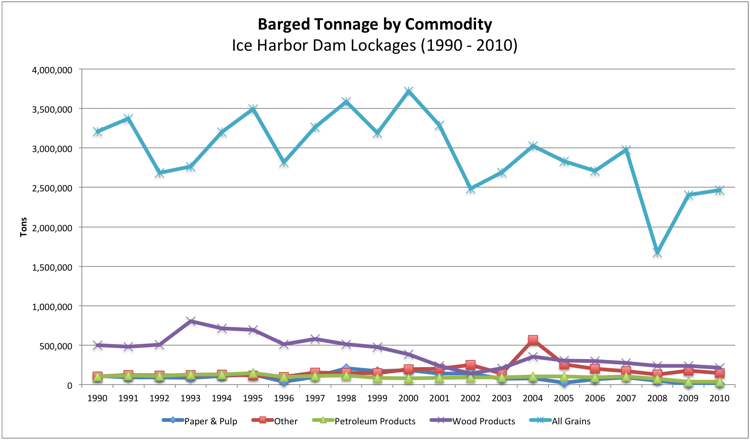forum
library
tutorial
contact

Losing Water Transportation is
A Big Blow to the Entire Region
by David Sparks
AgInfo.net, June 17, 2015
|
the film forum library tutorial contact |

|
Losing Water Transportation is
by David Sparks
|
Sean O'Connell of Pacific Northwest Farmers Co-op says losing water transportation
is a big blow to the entire region and worries that growers will plant other crops
 Over the past two days, we have been discussing the tumultuous situation at Port of Lewiston where, due to a year-long labor dispute with unions, container ships from Lewiston are no longer available to Northwest farmers.
Over the past two days, we have been discussing the tumultuous situation at Port of Lewiston where, due to a year-long labor dispute with unions, container ships from Lewiston are no longer available to Northwest farmers.
This has caused major problems to, among others, pulse crop producers who wish to export their commodities to overseas buyers.
Sean O'Connell of Pacific Northwest Farmers Co-op says losing water transportation is a big blow to the entire region and worries that growers will plant other crops.
"It concerns me a lot. Our company as well as a lot of other companies have built programs based upon these crops. If farmers choose other options, then that makes me wonder what I am going to do. We have a lot of people who work in this division and a lot of families that rely on these crops being grown."
Bert Brockey, from George Brockey, and Sons Warehouse where most of the legumes In the area are processed for overseas shipments says they are doing everything possible to keep shipping costs low. The best resolution would be to have the river back.
"We are doing everything we can to maintain and move forward the same way that we always have. We don't want any differences, hopefully, at all. There was some talk today about having to pass it on to the grower. Unfortunately, at some point, it will come to that. We hope that we get a river system back so that we can keep our good rates and move forward that way."
Related Pages:
Energy Intensities of Freight: Barge, Truck and Railroad US Department of Energy, Transportation Energy Data Book
Economic & Environmental Impacts of Extended Lock Outage by Dr. Ken Casavant, Freight Policy Transportation Institute, 8/11
Industry Reactions to the Columbia-Snake River Extended Lock Outage by Dr. Ken Casavant, Freight Policy Transportation Institute, 6/11
Related Sites:
Columbia Snake River System Extended Lock Closure by Pacific Northwest Waterways Association
From Survey conducted following the 2011 Extended Lock Outage (see Economic & Environmental Impacts of the Columbia-Snake River Extended Lock Outage by Dr. Ken Casavant Freight Policy Transportation Institute, August 2011)
Table 2.3 Typical Wheat Transportation Rates by Survey Respondents
Source: Elevator Firm Survey (Washington, Oregon and Idaho) - Washington State University ($/bushel)Region Number of Firms Direct Truck to Final Market Truck-Barge Rail Eastern Oregon 5 $0.50 $0.29 $0.58 Northern Idaho 5 $1.50 $0.58 $0.73 Southern Idaho 3 $0.71 $0.86 $0.83 Northern Washington 5 $0.52 $0.57 $0.54 Southern Washington 8 $1.22 $0.47 $0.55 Pacific Northwest 26 $0.89 $0.55 $0.65 (bluefish adjusts for
volume differences by
region, Table 3.1)$0.92 $0.51 $0.59 Excerpt from Economic & Environmental Impacts of the Columbia-Snake River Extended Lock Outage by Dr. Ken Casavant Freight Policy Transportation Institute, August 2011: However, energy consumed per ton decreased 4.8 percent due to the heavy use of rail, which is more energy efficient than barge or truck, and the increased use of barge prior to and after the lock outage.
learn more on topics covered in the film
see the video
read the script
learn the songs
discussion forum
